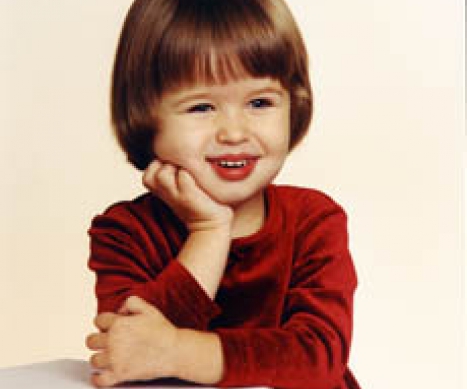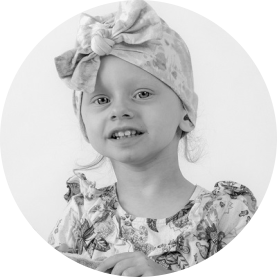- Neuroblastoma


Click the images to see them larger above!
Learn more about
Neuroblastoma
Get the facts about Neuroblastoma and how our research projects are making a difference.
Learn More »Natalie Catherine Pawelski was an amazing child. She had an older sister, Emily, and a younger brother, Erik. It was easy to lose sight of Natalie between the boisterous and sometimes demanding Emily and the little bundle of energy known as Erik. Natalie was quiet and shy and often stayed in the background.
Natalie seemed very sweet, gentle and timid. By eighteen months of age, her personality became a concern as she rarely spoke and was slow to respond when called. The doctors thought that she might be moderately retarded. She’d stare at us with big, blue eyes and we’d wonder just who was behind those eyes. At this point, we really didn’t know Natalie at all. Unbeknownst to us, Natalie’s hearing was diminished due to constant fluid in her ears. She lived in a quiet world where the volume was always turned down. To compensate for her hearing loss, Natalie became very observant. She could read lips, body language and facial expressions. She noticed every gesture and became an expert at human behavior. She was completely tuned in to the people around her, figuring out how they felt and what they thought. This resulted in Natalie becoming the most empathetic and compassionate person I ever knew. She automatically thought of the other person before herself, something that would define all her relationships.
At age 2 years and three months, Natalie got her adenoids removed and had ear tubes put in. Within weeks, she blossomed and became a wonderful person. She remained very loving and caring, while she developed a great sense of humor and a very happy personality. All these traits made her a natural people magnet and she became everyone’s favorite. She loved to dance and sing, now that the music could be heard clearly. Natalie was her most content when surrounded by immediate and extended family. She was happy to just be part of the gang. She was the first one to join in a hug, making it a group affair. In fact, whenever Mom and Dad would hug, Natalie would race to join in, snuggling between our legs. People mattered to Natalie, much more than things. In fact, she was a child who was impossible to shop for. When asked what she wanted for her birthday, she’d say, “Nothing”. In desperation, we’d take her to the toy store and ask, “Do you want this? How about that?”, and still nothing would appeal to her. Finally, she became excited and pointed across an aisle saying, “Oh, Mama, look!” When I asked what she wanted she told me, “Look at that over there. I have that at home. I just love it.” Natalie was content with what she had, and needed nothing more than just to be loved.
Our happiness with the real and true Natalie lasted only about a year. When Natalie was three years and two months old, she began slowing down, complaining that her asthma was bothering her. In the next few weeks, she said that her hips and legs hurt. Three doctor appointments and multiple tests pointed to a severe viral infection or possibly juvenile rheumatoid arthritis. After a month of searching for answers, Natalie’s pain escalated and we took her to the emergency room. The first doctor came up with the same vague diagnosis of a virus. A second doctor came in as the shifts changed. She wasn’t satisfied and looked further, until she discovered the 10 cm tumor in Natalie’s abdomen. Natalie had stage IV neuroblastoma, with a primary tumor in her belly, and tumors in her pelvis, femur, humerus, and spine. She had cancer cell-filled fluid surrounding her heart and lungs. Within four days, she was on a ventilator with a collapsed lung. Within six days, she was permanently paralyzed.
Natalie’s neuroblastoma was the worst case that many of her hospital care takers had ever seen in their careers. It was very widespread and she had every poor prognostic factor to go with it. Not a single test came back in her favor. Poor Natalie seemed doomed. Yet, despite losing the use of her legs and losing the hair she was so determined to grow long, she remained her positive, happy self and attracted nurses, doctors and aides with her charm and smile. Once again, she was everyone’s favorite. We respect and admire everyone at our home hospital for allowing themselves to completely fall in love with Natalie. They made the choice to love despite knowing that their hearts would most likely get broken in the end. Natalie lost her brief, courageous battle with neuroblastoma after only five months on June 30, 2003, at the age of three years and nine months.
Our family struggles mightily to continue our lives without Natalie’s love and optimism. She was a powerful force that kept our family strong. She added immeasurable amounts of happiness to our days. We find her strength and grace in the face of her challenges an inspiration. Even now, she is what keeps our family going. Her life and death have inspired us to do what we can to help find a cure for childhood cancer. We visit our home hospital, encourage those who cared for Natalie in her illness, and we hold our Alex’s Lemonade Stands in her honor. To Natalie and all the childhood cancer angels and warriors: We remember you, think of you and pray for you.
-The Pawelski Family
| MY HERO - By: Natalie's Sister There are lots of ordinary heroes. Some of them are firefighters, policemen, soldiers, rock stars, athletes, movie stars, governors and presidents. There are pretend super-heroes like spider man. Some of these people are heroes because they save people. Most of these heroes are brave, strong, big, smart or famous. All these heroes are grownups. But some heroes are not like others. Heroes come in different shapes and sizes. These other heroes are small and young. They are brave and strong in their hearts, even though they are little. My sister, Natalie, was a different kind of hero. She had cancer. She was very brave. When she was in the hospital, Natalie had to have x-rays, M.R.I.s, tests and operations. She was courageous when she had all these things. Even though she had scary times, Natalie was happy. She smiled and laughed and was not sad. She didn’t feel sorry for herself even though her legs did not work and her hair fell out. Natalie was considerate when she went to the hospital gift shop. She always bought candy for me, our brother Erik, and herself. Natalie was a good sister. I’m very proud to have a hero as a sister. |
Donate in Honor of Natalie Today!
Your donation helps to fund critically-needed research to find better treatments and cures for children with cancer.





